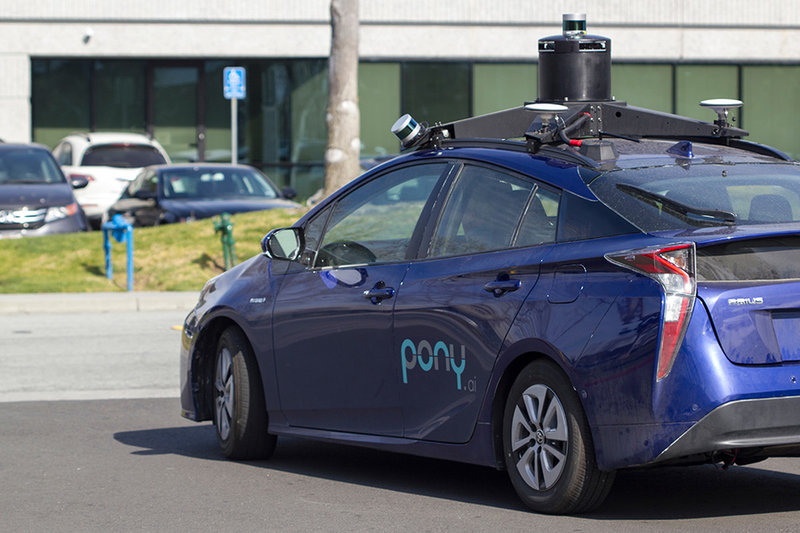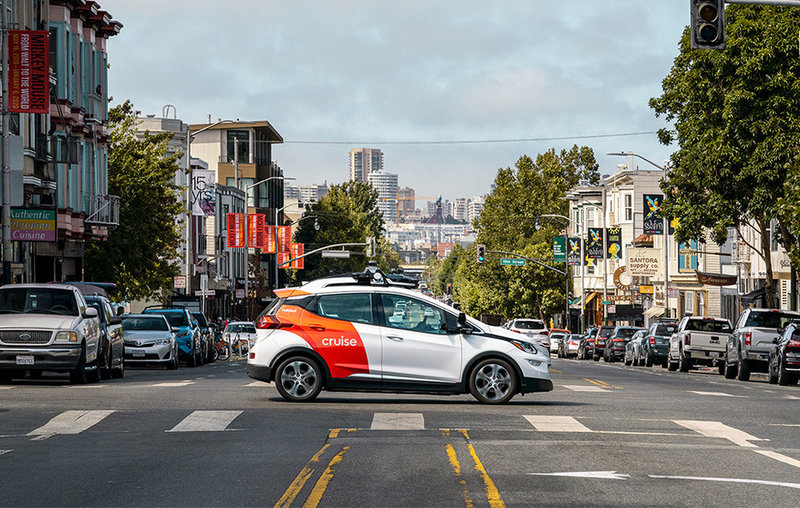Tomorrow’s Transport
Could Covid-19 Be the Driving Force Behind Autonomous Vehicles?
The Covid-19 pandemic has had a transformative impact on transport habits, but could it impact the rollout of autonomous vehicles? Ellen Daniel finds out

Over the past decade, the automotive industry has had to adapt to changing attitudes to mobility, with global car ownership predicted to peak in 2034 before beginning its decline . However, with many still reluctant to use public transport due to the risk of infection, as well as the need to promote alternative forms of transport to reduce pressure on trains and buses, the prospect of owning a car may seem more inviting in the context of Covid-19.
Although it is too early to fully assess its impact, Covid-19 may be accelerating the pace of innovation in the automotive industry, with car subscriptions, micromobility and autonomous vehicles all set to feel the impact of the pandemic.
This change in attitudes towards mobility is already evident in the adoption of micromobility solutions, with the UK government permitting rented e-scooters to operate on public roads as part of a year-long trial.
Some have predicted that autonomous vehicles, capable of driving with some to no human input, may see an acceleration in terms of development, deployment and public interest.
Cruise driving on San Francisco Streets. Video courtesy of Cruise
"Consumers are going to get used to these changes"
“With industrial activity forced to slow down, flight and car journeys decreasing, greenhouse gas emissions around the world have plummeted,” said John Kitchingman, managing director, EuroNorth at software company Dassault Systèmes.
“In fact, the drop in automobile / airline travel has even caused air pollution levels to fall. So, if there is something positive to take from the coronavirus crisis, it could be that it’s offered a taste of the air we might breathe in a low-carbon future.
“Consumers are going to get used to these changes and this is likely to see an increase in the adoption of autonomous vehicles in the future. These new vehicles will be efficient, affordable, clean and green and a natural feature in smart cities and interactive communities – and will forever change the future of mobility."
“These new vehicles will be efficient, affordable, clean and green and a natural feature in smart cities and interactive communities – and will forever change the future of mobility.”
Of course, like every industry, the automotive industry has experienced disruption as a result of the pandemic, with vehicle part manufacturing and assembly, as well as the production of chips, key for connected and autonomous vehicles, affected by factory closures. A drop in demand for new cars has also seen revenue in the automotive power semiconductor market fall by 16%.
R&D spending in the automotive industry has also been affected, according to Deloitte, which noted that "auto companies may be forced to divert capital to shore up continuing operations, starving R&D funding for advanced technology initiatives and other discretionary projects."
The pandemic also saw the suspension of some driverless car trials, with Alphabet subsidiary Waymo partially pausing pilots in Phoenix, Arizona in March to protect the health of backup drivers. According to Tech Crunch, Cruise, Argo AI, Pony.ai and Uber have also temporarily suspended driverless car tests in some form this year.
It is also important to highlight that fully autonomous cars are not yet available for public use, with most still at the pilot or test stage.
Changing attitudes
However, despite these setbacks, there is reason for optimism in the industry, with many predicting that Covid-19 may in fact have a positive impact on driverless car deployment.
"The Covid-19 pandemic changed virtually every industry in the world, including automotive," said Danny Shapiro, senior director of automotive at Nvidia.
"Despite the pandemic, autonomous vehicle development continues to make great strides forward. For example, Mercedes-Benz announced this summer it is developing an AI software-defined vehicle architecture built on Nvidia DRIVE, with production starting in 2024. Automakers like Mercedes-Benz are able to leverage the AI expertise, development platform and infrastructure from Nvidia to accelerate their research and development while reducing costs."
One of the key barriers to autonomous vehicle rollout is public perception, with a 2018 survey by OpenText revealing that 52% of consumers would not buy a driverless car.
“The Covid-19 pandemic changed virtually every industry in the world, including automotive.”
However, the Covid-19 pandemic may have contributed to changing attitudes. According to Motional's Consumer Mobility Report one fifth of Americans surveyed are more interested in driverless vehicles than they were before the pandemic, with 62% believing self-driving vehicles are "the way of the future".
Motional, which was created by Hyundai and Aptiv, described 2020 as a "pivotal year for driverless technology" with the pandemic leading many to re-think transportation and how cities are planned.
The pandemic has also created new requirements and expectations when it comes to transporting both goods and people, with hygiene and social distancing prioritised as well as safety.
Widely reported instances of driverless car fatalities, such as the death of a pedestrian in Arizona in 2018 after they were hit by an autonomous car being tested by Uber, have unsurprisingly affected public perception of autonomous vehicles. However, when weighing up the risk of Covid-19 infection presented by public transport or shared mobility, it is possible that the public will look more favourably on driverless cars.

Image courtesy of Tada Images / Shutterstock.com
The benefits of automation
Kristina Church, senior investment strategist of sustainability at Lombard Odier believes that it has also created greater awareness of the benefits of automation in the supply chain which was put under strain due to Covid-19:
"The ability of Covid-19 to pause the shipment of goods has spotlighted the human factor of transporting goods as a weak link in the global supply chain of goods. Unlike humans, AV systems can run all day and night, are not susceptible to 14-day quarantines and do not face driver shortages."
McKinsey predicts that the Covid-19 pandemic could have a "lasting impact" on mobility, with the company anticipating that in the long term, customer demand for technology such as autonomous vehicles and micromobility solutions "could soar once the initial crisis subsides". However, in the shorter term, testing and development of such technology may be suspended and investors may be more cautious.
“Unlike humans, AV systems can run all day and night, are not susceptible to 14-day quarantines and do not face driver shortages.”
It predicted that demand for autonomous vehicles could end up being higher than expected, once the technology is approved for on-road use, due to their enablement of physical distancing.
"The current pandemic has had a significant impact on transport demand and mode, with a shift away from shared mobility, and in particular public transport, because of worries over public health,” said Church.
“There has been short-term disruption to autonomous vehicle development and roll-outs, with the financial disruption likely to cool many global automakers' enthusiasm for pursuing autonomous vehicle technology and also putting at risk the shared flight model of eVTOLs. But at the same time, consumer attitudes to social-distancing for their mobility options, as well as growing demand for resilient global supply chains, may in the longer-term benefit AV technology."
However, KPMG's Autonomous Vehicles Readiness Index noted that this will be largely dependent on what "countries, jurisdictions and localities do to further AV development and deployment", naming Singapore, the Netherlands, Norway and the US as the countries most prepared for autonomous transportation.
In August, the UK government announced that it was reviewing legislation on driverless cars, with the Department for Transport currently reviewing evidence on Automated Lane-Keeping Systems on motorways.
Autonomous deliveries
The acceleration of autonomous vehicles will not be limited to personal vehicles. According to Foley and Lardner LLP, while there may be a short-term disruption to autonomous vehicle development and roll-out, the industry could also be accelerated as the technology is seen as "a vital component of responding in times of emergencies and uncertainty".
In China, technology company Baidu has rolled out 104 driverless vehicles to carry out tasks such as disinfecting and transporting goods in cities and hospitals in various parts of the country.
“The demand for contactless deliveries and ecommerce is another potential driver for the adoption of driverless vehicles, as has been the case with drone technology.”
The demand for contactless deliveries and ecommerce is another potential driver for adoption, as has been the case with drone technology.
In the US, Toyota-backed Pony.ai launched an autonomous delivery service in April, partnering with ecommerce platform Yamibuy to deliver packages and groceries in Irvine, California. General Motors's self-driving car startup Cruise has used autonomous vehicles to deliver food to the elderly in the San Francisco area.
Despite the ongoing uncertainty caused by the pandemic, there is still an appetite for innovation.
In London, the Smart Mobility Living Lab, a testbed for driverless cars, officially launched in September amid the pandemic, with the site now open for commercial testing from public and private sector organisations.
Using public roads in Greenwich and around the Queen Elizabeth Olympic Park in Stratford, the Smart Mobility Living Lab allows connected and automated vehicle trial programmes to be carried out both virtually and in the real world and is considered the most advanced urban testbed for autonomous vehicles in the UK.
Although the lab's official ribbon-cutting ceremony had to be held virtually due to Covid-19, the fact that the launch went ahead suggests that there is keen interest from the industry in continuing to develop and test autonomous vehicle solutions, despite facing high levels of uncertainty.
As well as the Smart Mobility Living Lab, O2, backed by the UK government, launched the Darwin SatCom Lab, a commercial driverless car testing lab.

Image courtesy of Cruise
Investing in future technologies
The deployment of level five autonomous vehicles, which can drive without human involvement, is still a long way from being commonplace on the road. While the evolving regulatory landscape varying greatly from place-to-place, it is encouraging to see indications that public perception is changing.
Although it is still unclear whether changes in attitudes and behaviour brought about by the pandemic will be long-lasting, as has been the case in many other industries, Covid-19 has highlighted the importance of harnessing new technologies.
However, Kitchingman believes that public perception of driverless cars still needs to be addressed if the technology is going to achieve widespread adoption:
“Investments in future technologies such as electric and autonomous vehicles are being protected where possible as companies know that if they are to ensure they thrive in the long-term, they need to continue to invest in future technology to come out of the pandemic stronger than their competitors.”
"While there’s much talk about autonomous vehicles, safety concerns mean that some technological hurdles will need to be overcome as some consumers are yet to trust autonomous vehicles. Simulation is an effective strategy to overcome technological hurdles that lead to a safe and effective autonomous vehicle."
Rob Harwood, global industry director at Ansys explained that many businesses will recognise the importance of investing in new technology for their long-term survival, even amidst economic uncertainty:
"Covid-19 has significantly impacted the aerospace and automotive industries. While we see immediate steps being taken to reduce costs across all aspects of company operations, investments in future technologies such as electric and autonomous vehicles are being protected where possible as companies know that if they are to ensure they thrive in the long-term, they need to continue to invest in future technology to come out of the pandemic stronger than their competitors.
“In fact, in both industries, companies continue to demonstrate that the technology and supporting infrastructure is achieving a high state of readiness with the regulatory environment playing catch up."
Back to top